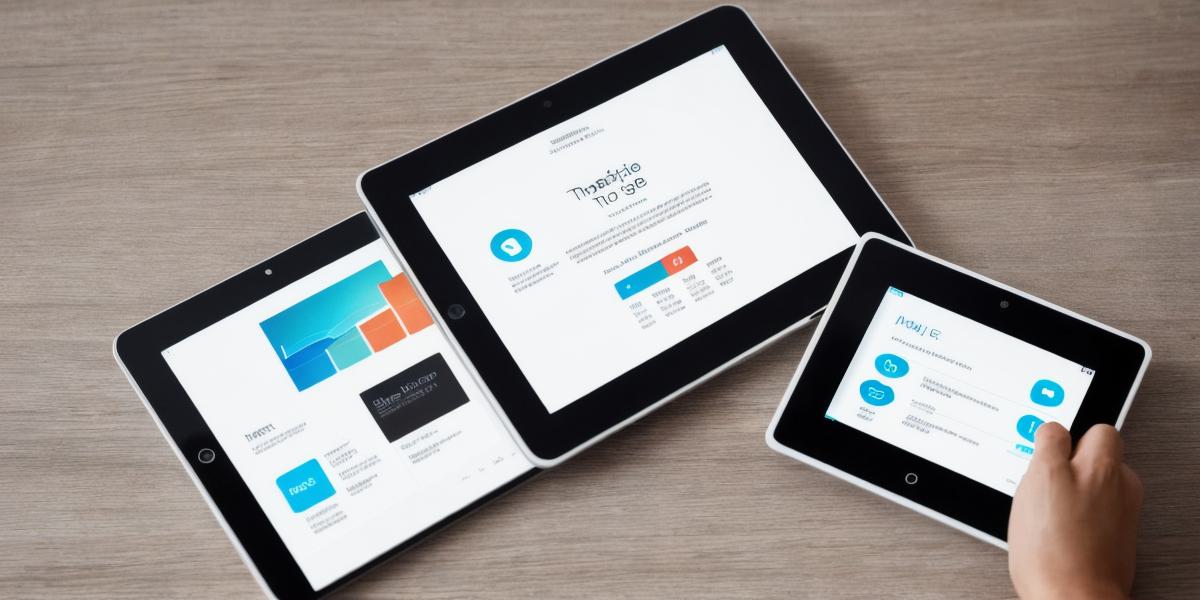In today’s digital age, businesses are constantly seeking ways to increase their online visibility and reach a wider audience. With the right tools in hand, they can achieve just that – and much more. In this article, we will explore the top 5 digital marketing tools for businesses that every company should have on their toolkit. We will delve into each tool’s features, benefits, and how to use them effectively, as well as real-life examples of businesses that have successfully utilized these tools to grow their online presence.
Table of Contents
Introduction
+ Definition of Digital Marketing Tools
+
Importance of Digital Marketing Tools for Businesses
- 1.
Google Analytics
+ Overview of
Google Analytics
+ Key Features and Benefits
+
Real-Life Examples
+ Tips for Using
Google Analytics
Effectively
- 2.
Hootsuite
+ Overview of
Hootsuite
+ Key Features and Benefits
+
Real-Life Examples
+ Tips for Using
Hootsuite
Effectively
- 3.
HubSpot
+ Overview of
HubSpot
+ Key Features and Benefits
+
Real-Life Examples
+ Tips for Using
HubSpot
Effectively
- 4. Mailchimp
+ Overview of Mailchimp
+ Key Features and Benefits
+
Real-Life Examples
+ Tips for Using Mailchimp Effectively
- 5. Ahrefs
+ Overview of Ahrefs
+ Key Features and Benefits
+
Real-Life Examples
+ Tips for Using Ahrefs Effectively
Summary
+ Recap of the Top 5 Digital Marketing Tools
- Final Thoughts on the
Importance of Digital Marketing Tools for Businesses
- Final Thoughts on the
Introduction
Digital marketing tools are software and platforms that help businesses promote their products or services online. These tools can be used to increase website traffic, improve social media presence, engage with customers, and more. In this article, we will discuss the top 5 digital marketing tools for businesses that every company should have on their toolkit. We will explore each tool’s features, benefits, and how to use them effectively, as well as real-life examples of businesses that have successfully utilized these tools to grow their online presence.
Importance of Digital Marketing Tools for Businesses
Digital marketing tools are essential for businesses in today’s digital age. They can help companies increase their online visibility and reach a wider audience, which can lead to increased sales and revenue. These tools can also be used to analyze customer behavior, track website traffic, and improve social media presence, among other things. By utilizing these tools effectively, businesses can stay ahead of the competition and stay relevant in the ever-changing digital landscape.
Google Analytics
Google Analytics
is a free web analytics service that allows businesses to track website traffic, analyze customer behavior, and more. It is the most widely used web analytics service in the world, with over 50 million active websites using it. Here are some key features and benefits of
Google Analytics
:
* Track website traffic:
Google Analytics
can provide valuable insights into how much traffic is coming to your website, where visitors are coming from, and which pages are performing best. This information can be used to make data-driven decisions about website design, content, and advertising campaigns.
* Analyze customer behavior:
Google Analytics
can track how long visitors spend on your website, what pages they interact with, and which products or services they are interested in. This information can be used to create targeted marketing campaigns and improve the overall customer experience.
* Set up goals:
Google Analytics
allows businesses to set up goals for their website, such as increasing sales or generating more leads. It can track progress towards these goals and provide recommendations on how to achieve them.
* Integrate with other tools:
Google Analytics
can be integrated with a variety of other digital marketing tools, such as email marketing platforms and social media management software. This allows businesses to have a comprehensive view of their online presence and make data-driven decisions about their marketing strategy.
Real-Life Examples
Many businesses have successfully utilized
Google Analytics
to improve their online presence. For example,
HubSpot
, an inbound marketing and sales software company, uses
Google Analytics
to track website traffic, analyze customer behavior, and set up goals for their website. By using
Google Analytics
effectively, they have been able to increase website traffic, generate more leads, and ultimately grow their business.
Another example is Shopify, an e-commerce platform that allows businesses to create online stores. Shopify uses
Google Analytics
to track website traffic, analyze customer behavior, and set up goals for their website. By using
Google Analytics
effectively, they have been able to improve the user experience on their website, increase sales, and grow their business.
Tips for Using
Google Analytics
Effectively
To get the most out of
Google Analytics
, businesses should:
* Set up tracking codes on all pages of their website
* Define clear goals and track progress towards them
* Analyze customer behavior on their website to make data-driven decisions about marketing strategy
* Integrate
Google Analytics
with other digital marketing tools
* Review reports regularly to stay up-to-date on website performance
Hootsuite
Hootsuite
is a social media management platform that allows businesses to manage their social media presence from one place. Here are some key features and benefits of
Hootsuite
:
* Manage multiple social media accounts in one place:
Hootsuite
allows businesses to manage their Facebook, Twitter, Instagram, and other social media accounts all in one place, making it easier to stay active on social media and engage with customers.
* Schedule social media posts:
Hootsuite
allows businesses to schedule social media posts in advance, which can help them save time and ensure that they are consistently posting relevant content.

* Analyze social media performance:
Hootsuite
provides valuable insights into how well their social media accounts are performing, including engagement rates, follower growth, and more. This information can be used to make data-driven decisions about social media strategy.
* Integrate with other tools:
Hootsuite
can be integrated with a variety of other digital marketing tools, such as email marketing platforms and website analytics software. This allows businesses to have a comprehensive view of their online presence and make data-driven decisions about their marketing strategy.
Real-Life Examples
Many businesses have successfully utilized
Hootsuite
to manage their social media presence. For example, Buffer, a social media scheduling tool, uses
Hootsuite
to schedule social media posts for all their accounts. By using
Hootsuite
effectively, they have been able to increase engagement on their social media accounts and grow their business.
Another example is
HubSpot
, which uses
Hootsuite
to manage their social media presence for multiple accounts, including Twitter, LinkedIn, and Facebook. By using
Hootsuite
effectively, they have been able to increase social media following, engagement, and ultimately drive more traffic to their website.
Tips for Using
Hootsuite
Effectively
To get the most out of
Hootsuite
, businesses should:
* Define clear social media goals and track progress towards them
* Schedule social media posts in advance to save time
* Engage with customers on social media by responding to comments and messages
* Integrate
Hootsuite
with other digital marketing tools
* Review reports regularly to stay up-to-date on social media performance
HubSpot
HubSpot
is an inbound marketing and sales software company that offers a suite of tools for businesses to improve their online presence. Here are some key features and benefits of
HubSpot
:
* Generate leads:
HubSpot
offers a variety of tools for generating leads, including landing pages, email marketing, and social media advertising. These tools can help businesses attract and convert more leads into customers.
* Improve website performance:
HubSpot
provides valuable insights into how well their website is performing, including traffic sources, conversion rates, and more. This information can be used to make data-driven decisions about website design, content, and advertising campaigns.
* Track customer behavior:
HubSpot
offers a variety of tools for tracking customer behavior on their website, including heatmaps, click tracking, and form analytics. This information can be used to create targeted marketing campaigns and improve the overall customer experience.
* Integrate with other tools:
HubSpot
can be integrated with a variety of other digital marketing tools, such as social media management software and email marketing platforms. This allows businesses to have a comprehensive view of their online presence and make data-driven decisions about their marketing strategy.
Real-Life Examples
Many businesses have successfully utilized
HubSpot
to improve their online presence and grow their business. For example, Shopify, an e-commerce platform that allows businesses to create online stores, uses
HubSpot
to generate leads, track website performance, and integrate with other digital marketing tools. By using
HubSpot
effectively, they have been able to increase sales, improve customer engagement, and grow their business.
Another example is Buffer, a social media scheduling tool that uses
HubSpot
to generate leads, track website performance, and automate their email marketing campaigns. By using
HubSpot
effectively, they have been able to increase engagement on their social media accounts, attract more leads, and ultimately drive more traffic to their website.
Tips for Using
HubSpot
Effectively
To get the most out of
HubSpot
, businesses should:
* Define clear marketing goals and track progress towards them
* Create targeted marketing campaigns based on customer behavior
* Automate email marketing campaigns to save time
* Integrate
HubSpot
with other digital marketing tools
* Review reports regularly to stay up-to-date on website performance and lead generation
Summary

Google Analytics
,
Hootsuite
, and
HubSpot
are just a few of the many digital marketing tools available to businesses today. By utilizing these tools effectively, businesses can improve their online presence, attract more leads, and ultimately drive more sales. To get the most out of these tools, businesses should set clear goals, analyze customer behavior, and integrate with other digital marketing tools. With the right strategy in place, businesses can stay ahead of the competition and grow their business in the ever-changing digital landscape.




